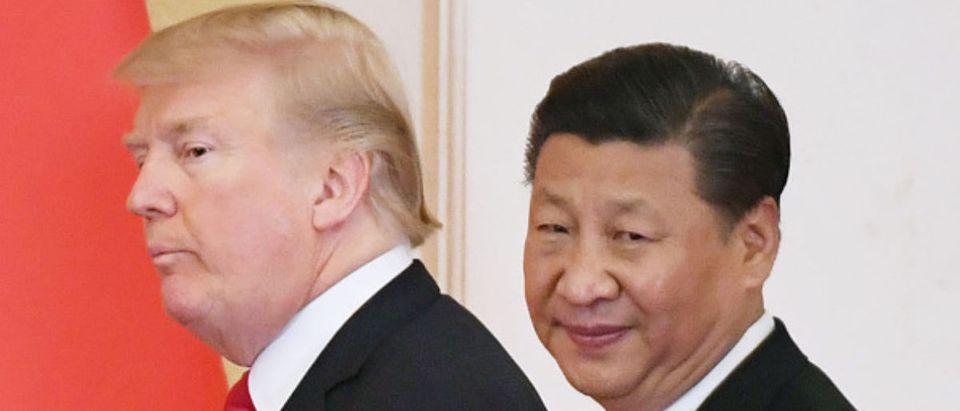Can Donald Trump play a long game against China? Can any president play a long game against China? China — the commentators relentlessly tell us — has been around for 4,000 years, which puts the U.S., now in only its third century, at a disadvantage. So the answer to the question is maybe, or maybe not.
The Chinese economy — pace those who told us that trade with the outside world would convert the Chinese into westernized free-marketeers — is still a command-and-control economy. As the wags say, if command-and-control economies worked, we’d all be speaking Russian.
China has several problems. One of them is named Donald Trump. Robert Lighthizer is the point man for the negotiations with the Chinese, but it’s his boss who will call the shots.
Who is the better negotiator: President Trump or China’s “President” Xi Jinping? (His title is in quotes because Americans are used to thinking of presidents as leaders who get elected by the people. Just when was the last Chinese president elected?)
Trump honed his negotiating skills in a free-market economy — though calling the New York City political environment “free market” guarantees a snicker from the back of the room. Still, that rough-and-tumble world was where Donald Trump learned his trade.
“President” Xi learned his skills in a controlled economy, where power comes from a barrel — and not a barrel of laughs. Xi reminds us of the quote attributed to Al Capone: “Things go great with a smile and a gun. But I find they go pretty well with just a gun.” The Chinese may be building big weapons, but they’re not ready for a shoot-out with the U.S. military just yet.
China has other problems too. It’s more dependent on exports than the U.S. is. The total tariffs on $505 billion of Chinese goods that the U.S. has proposed would reduce China’s GDP by 1.2 percent while reducing U.S. GDP by only 0.2 percent. It’s true that in a democracy, economic pain can be transmitted to the top quickly through the electoral process. But having half a billion or so very unhappy formerly middle-class Chinese bicycling around looking for dried rice can present problems — even if you are good with a smile and a gun.
At the recent meeting between Trump and Xi in Buenos Aires, the U.S. agreed to suspend for ninety days the tariff increase on $200 billion worth of goods from 10 percent to 25 percent slated for Jan. 1. Trump indicated that 90 days didn’t mean 91 days.
While Trump and Xi were having dinner, the Canadians, at the Americans’ request, detained Meng Wanzhou, the 46-year-old chief financial officer of (and daughter of the founder of) Huawei Technologies. Huawei, the world’s largest maker of telecom equipment, is suspected of exporting American technology to Iran at Meng’s direction.
The Chinese Foreign Ministry put out a statement that was pure Harvard Lampoon. It accused Canada of “severely violating the legal, legitimate rights of a Chinese citizen.” Don’t miss the “severely.” And also don’t miss the recent increased persecution of Christians in China, said to be the most intense since the “cultural revolution.”
The big question at the dinner was: Did Trump know about Meng’s apprehension in advance? The White House claims no. The Chinese probably can’t believe that (can you?) and that’s just fine. We want them to see Trump as an American cowboy who just might — what the hell — hike the tariffs up to 25 percent a few days early because he wanted to go golfing at Mar-a-Lago. That’s the art of the deal.
Another of China’s problems is that economics is not Trump’s only concern, and probably not even his top concern. His top priority is jobs. Creating jobs for out-of-work Americans is more important to him than the country’s bottom line, e.g., the size of the GDP, the Dow Jones Industrial Average, or the fortunes of the Wall Street “bankster” — most of whom are friends of Hillary anyway.
It’s true that unemployment is as low as it’s ever been, at least for blacks (how those numbers must sting former President Obama!), but those numbers only take you so far.
As Oren Cass, the author of a brilliant new book, “The Once and Future Worker,” pointed out in a recent op-ed, although unemployment figures are low, millions of working age men are no longer looking for jobs. Cass says that by “the pre-2007 standard, today’s labor market would be the worst on record.” Those unemployed people who weren’t on opioids on Nov. 8, 2016, voted for Donald Trump. He hasn’t forgotten that. And neither should “President” Xi.
Given Donald Trump’s negotiating advantages, when the deal is finally done, “President” Xi is likely to be jinping up and down in frustration. But even Xi can’t do that for all of Trump’s remaining two, or maybe six, years.
Daniel Oliver is chairman of the board of the Education and Research Institute and a director of the Pacific Research Institute for Public Policy in San Francisco. In addition to serving as chairman of the Federal Trade Commission under President Reagan, he was executive editor and subsequently chairman of the board of William F. Buckley Jr.’s National Review.
The views and opinions expressed in this commentary are those of the author and do not reflect the official position of The Daily Caller.












